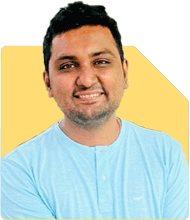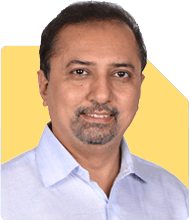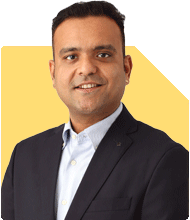Abhishek Shah | Answer |Ask -Follow
HR Expert - Answered on Jan 07, 2024

I'm 44 year old. I am project manager in road construction. I am doing a job in construction(interrupted) since 21 years. Now I am getting 15 lacs per annum. But now I am in trouble having no job since 6 months. Still living as a tenant.What should I do now either business or go to that service?
You may like to see similar questions and answers below
Chandu Nair | Answer |Ask -Follow
VC, Angel Investing, Entrepreneurship Expert - Answered on Jul 02, 2023
Krishna Kumar | Answer |Ask -Follow
Workplace Expert - Answered on Feb 09, 2024
Krishna Kumar | Answer |Ask -Follow
Workplace Expert - Answered on Feb 07, 2024
Rohit Gupta | Answer |Ask -Follow
Edtech/Online Education Expert - Answered on Jan 10, 2024
Nayagam P P |10854 Answers |Ask -Follow
Career Counsellor - Answered on Dec 14, 2025
Radheshyam Zanwar |6744 Answers |Ask -Follow
MHT-CET, IIT-JEE, NEET-UG Expert - Answered on Dec 14, 2025
Radheshyam Zanwar |6744 Answers |Ask -Follow
MHT-CET, IIT-JEE, NEET-UG Expert - Answered on Dec 14, 2025
Dr Dipankar Dutta |1840 Answers |Ask -Follow
Tech Careers and Skill Development Expert - Answered on Dec 14, 2025
Dr Dipankar Dutta |1840 Answers |Ask -Follow
Tech Careers and Skill Development Expert - Answered on Dec 13, 2025
Dr Dipankar Dutta |1840 Answers |Ask -Follow
Tech Careers and Skill Development Expert - Answered on Dec 13, 2025
Mayank Chandel |2575 Answers |Ask -Follow
IIT-JEE, NEET-UG, SAT, CLAT, CA, CS Exam Expert - Answered on Dec 13, 2025
Radheshyam Zanwar |6744 Answers |Ask -Follow
MHT-CET, IIT-JEE, NEET-UG Expert - Answered on Dec 13, 2025
Mayank Chandel |2575 Answers |Ask -Follow
IIT-JEE, NEET-UG, SAT, CLAT, CA, CS Exam Expert - Answered on Dec 13, 2025
Mayank Chandel |2575 Answers |Ask -Follow
IIT-JEE, NEET-UG, SAT, CLAT, CA, CS Exam Expert - Answered on Dec 13, 2025

























